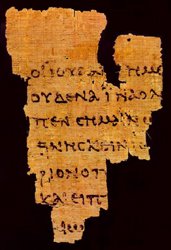Textual Reliability¹Historical Reliability

As Christians, we believe that we have good evidence to believe the New Testament was accurately copied (e.g. # of MSS; early dating of those MSS; and accuracy of those MSS). From this evidence, often times, some Christians assume that somehow this proves that the Bible is true and warrants our belief. Not everyone agrees with this. Some people, namely skeptics, claim that the New Testament was not accurately copied, that it contains too many errors. Therefore, some skeptics assume that the New Testament cannot be trusted, and therefore Christianity must be false. I think both of these cases are simply a case of "it doesn't follow." Consider:
1) Many skeptics have claimed that the New Testament is "full of errors" (200,000 of them) and cannot be trusted. From this claim, many people fear that if this were true then somehow Christianity must be false. Now, we know that this simply isn't true, the Bible isn't "full of errors" and in fact of all the textual variants that we have none of them affect a major doctrine.
This is beside the point, however. To say that Christianity must be false because there are 200,000 errors in the New Testament simply doesn't follow. Let's suppose that someone could prove all 200,000 errors. This would indeed invalidate the textual reliability of the New Testament, but this wouldn’t invalidate the historical reliability of the New Testament. There is still plenty of external evidence (e.g. archeology, early Christian writers, ancient secular sources)which would support the claims of Christianity. If these supposed errors were true it would only prove that we have an unreliable text.
2) After going through all of the evidence for the textual reliablity of the New Testament some think that this is enough to warrant belief in what the New Testament says. However, this is a category mistake since it (again) confuses textual reliability with historical reliability. The question isn't "Do you believe what the New Testament says?" but "Do you believe that the New Testament is accurately copied?"
What is my point? Perhaps it might be to make sure that you don't try and prove more than the evidence suggests. What are your thoughts?
1 Comments:
Aaron,
It is a good point that we should be careful to rely on valid conclusions.
Textual Analysis shows us that we truly have what the original authors wrote. Historical Analysis shows us that what the original authors wrote is true.
But perhaps this is what some skeptics may be thinking:
For certain historical claims, the Bible is the only (or primary) evidence. In those cases, the historical reliability may be very closely linked to the textual reliability.
What do you think?
Post a Comment
<< Home